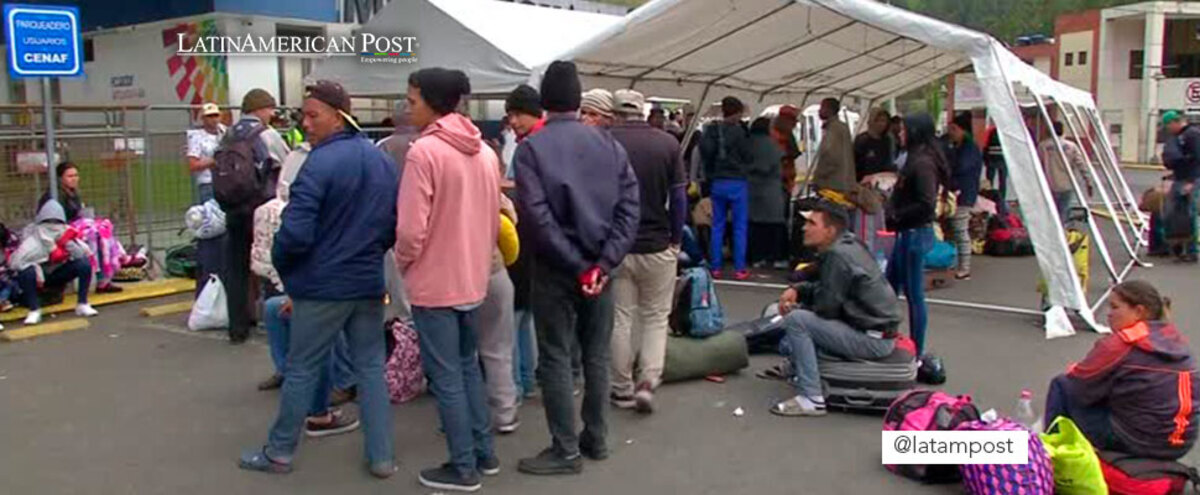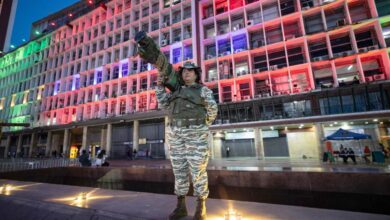What Can Latin America Teach Europe About Migration Crises?
The Russian invasion of Ukraine may bring with it the exodus of thousands of Ukrainians in the short term. In Latin America, a similar situation is already being experienced with the emigration of Venezuelans to various countries on the continent .

Photo: Reuters
LatinAmerican Post | Nicolás Donoso
Escucha este artículo
Leer en español: ¿Qué le puede enseñar Latinoamérica a Europa con la crisis migratoria en Ucrania?
One of the most recent war episodes and one that has caused the greatest interest and concern in equal parts throughout the world is Russia's invasion of Ukraine. According to one of the balances of the United Nations Organization (UN), to date, there are 516 deaths and 908 injuries; figures that, according to official sources, are "considerably higher", since only in Mariúpol the death of more than 2,500 people is reported.
The panorama is discouraging, because according to the UN itself, at the beginning of March and when the conflict had hardly exploded, more than a million Ukrainians had left their country to go mainly to neighboring territories, half of them went to Poland. If this trend continues over time, it could exceed the number of people who had to emigrate, for example, during the Balkan War in the 1990s (more than 3 million people emigrated).
The war that has recently caused the most displacement of civilians is the one in Syria, a conflict that began more than a decade ago and is considered the greatest humanitarian crisis. The UN estimates that more than 6 million Syrians are currently in refugee status.
Boric is inspired by the European Union to help Venezuelan migrants
Precisely the migratory crisis that primarily mobilized Europe was that of Syria, and to regularize that the European Union decided to use a quota system, where the 28 countries that make up the organization have to act in a cohesive manner and welcome the millions of Syrians. The system was distributed according to an instrument that measured the wealth of a country and the number of inhabitants that make up each nation, and based on these variables, the EU countries divided the reception of refugees.
#Chile vive una crisis migratoria sin precedentes
El Gobierno chileno desplegó más de 600 efectivos en el norte del país, tras las protestas que pedían más control en la #migración. Los locales afirman que los migrantes son los causantes del aumento de la inseguridad. /tg pic.twitter.com/fOjO8dY1MT
— DW Español (@dw_espanol) February 19, 2022
Currently, the quota system has begun to be mentioned with some frequency in Latin America after the current president of Chile, Gabriel Boric, in one of his first conferences with the foreign press, indicated that in order to solve part of the migratory crisis that Venezuela is going through, the quota system put in place by the European Union to help Syria must be applied. "We have to express Latin American solidarity, and there all the countries of the region, Brazil, Argentina, Uruguay, Paraguay and also Bolivia, have a role to play."
Data from the UN Refugee Agency (UNHCR) are lapidary: since 2014, displacements from Venezuela to other countries (mainly neighboring) have skyrocketed and there are more than six million Venezuelans as refugees and migrants. In addition, according to UNHCR, at the end of 2020, Colombia (29.7%), Peru (19.8%) and Chile (19.7%) were the nations with the largest flow of Venezuelans, and in 2022 that remains the same.
You may also be interested in: Peru, A Country Without A President: Castillo Will Face Another Impeachment
For the same reason, it is not surprising that Gabriel Boric proposes this solution, but it must be understood that the quota system is not as great as it seems. Since to be received in another country in many circumstances one must be recognized as a refugee, and to be one a person has to be persecuted for reasons of "race, nationality, religion, political opinions, gender or sexual orientation" and each country can decide under its criteria and laws whether to give asylum to a person or not. And in the face of this categorization, many migrants can be left out.
The achievements of Latin America in terms of immigration and its challenges
That is why Boric raises the idea of acting together as countries, to divide efforts and go to the aid of a Venezuela that has had a very bad time for many years. But for that to work, the cooperation of all Latin American countries is required, or else what has happened in Europe will happen again.
In terms of Latin American achievements in this matter, the measure taken by President Iván Duque last year in relation to the massive regularization of Venezuelan immigrants can be considered as an example for Latin America and the rest of the world to follow .
According to data from the Spanish media outlet El País, more than a million undocumented Venezuelans are protected by this new temporary status, which, among many other things, allows Venezuelan migrants to access state benefits for ten years and, subsequently, at that time, to be able to opt for residence if they want to settle in the territory.
Because regularizing often goes hand in hand with dignifying people's lives, the urgent need to control must also be raised. That will prevent unfortunate episodes like those that occurred in northern Chile last year, when an anti-migration march against Venezuelans ended with the burning of belongings of migrants from that country. Lessons, learning and actions, which must be carried out in Latin America, in Europe and throughout the globe.




